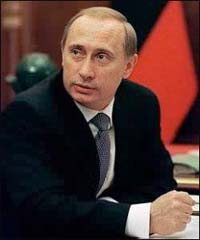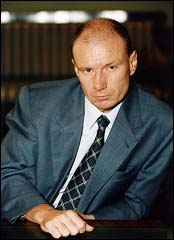 INTRODUCTION - RUSSIA'S GLOBAL INTEGRATION
INTRODUCTION - RUSSIA'S GLOBAL INTEGRATION |
Remember 1998 and the days of Russia's economic
and financial meltdown? Well, have a look at Russia
under Vladimir Putin, because those days of economic
and financial anarchy are well and truly gone. Indeed,
Russia is starting to prove that the clichés
about its economy and society do not necessarily
resonate in its reality.

President Vladimir Putin
Prime Minister
Kasyanov sees "the normalization of public
life and the step-by-step restoration of the middle
class, which suffered most during the financial
crisis of 1998. Stability at last has firmly settled
in Russia." There is a clear improvement
of economic conditions, industrial growth, and
a profitable state budget - figures that are positively
perceived by Russian citizens.
The 1998 rouble crisis is now nearly five long
years away and businesses in some sectors - notably
IT and consulting, but also oil - have even come
to the conclusion that the crisis offered an opportunity.
Russia's increasingly stable economic prosperity
saw an increase of GDP in 2002 by more than 4%
on the previous year to around $11 billion. There
was a budget surplus nearing $7 billion, or some
2% of GDP, and inflation dropped. A major challenge
will be to pass through the years 2003-2005 as
these will be tough years considering Russia's
debt commitments. The government hereby aims for
an annual growth of 4 to 6% of GDP. Promisingly,
there are an extra $11.3 billion of gold and foreign
currency reserves, which the Central Bank expects,
with the help of oil, to total $55 billion by
the end of 2003. Indeed, the Russian Federation
is, albeit very gradually, paying off its debt
to the IMF ahead of schedule and expects to pay
back some $2 billion by the end of 2003.
Russia is looking increasingly favourable to for
example American investors. For example, the Russian-American
Business Dialog that was instigated in 2001 has
been strongly endorses by the Russian and American
Presidents and has already become a major force
influencing decision making in bilateral relations,
says Prime Minister Kasyanov. As pointed out by
Andrew B. Somers,
President of the American Chamber of Commerce
in Russia (AMCHAM), Coca
Cola, Pepsi Cola, Procter & Gamble, Gillette,
Kodak, Cisco, IBM, Microsoft, Intel and GE are
all in Russia making money. He emphasised that
"In fact, these American companies are doing
extremely well in Russia; sales growth in 2000
compared to 1999 was in double and triple digit
figures, and the same is true for 2001 over 2000"
and the trend continued in 2002.
Also from a trading point of view Russia is leaping
forward. The state of Russia's economy was not
up to scratch in 1998, which caused a trade deficit
with the trade balance reduced to a critical level
of $2 billion. Times have changed indeed. Russia's
foreign trade balance was positive at $59.8 billion
in 2002, an increase of $1.7 billion compared
to 2001. Exports rose 9.8 percent against 2001,
totalling $105.8 billion. The European Union countries,
led by Germany, accounted for 36.6 percent. Russia
is now a fully fledged member of the G-8 group
of countries, has been awarded market economy
status by the European Union and the United States,
and is well on its way to becoming a member of
the World Trade Organisation (WTO).
|
Promisingly, there is
a growing awareness in Russia that economic methods
of regulating foreign trade are more effective than
administrative ones. Vital for the future of Russia
is the making of a new customs law that is planned
for implementation in July 2003. The code was prepared
by the States Customs Committee, the Ministry of
Economic Development and the expertise of the EU
and the WTO. Mikhail Vanin,
Chairman of the State Customs Committee of the Russian
Federation, stresses that "This new code envisages
new customs regimes used internationally to develop
industry and investments. This new customs regime
includes transforming goods in order to add new
value to them under customs control (for there not
to be duties when they are re-exported), leasing,
or temporary import."
There are still many issues which need to be addressed
before the Russian Federation is accepted into the
WTO but progress is being made: "the speed
we are moving at is different from one issue to
the other", says Maksim
Medvedkov, Deputy Minister for Economic Development
and Trade, "we have started real discussions
on systemic issues which will be included in the
so called Protocol of Accession (and) I believe
that we could complete this process rather rapidly,
provided that all the factors are realistic."

Vladimir Potanin - CEO of the Interros Holding
Vladimir Potanin, one-time oligarch and nouveau-philanthropist,
believes the most important aspect of the process
is to carefully consider Russia's aims in joining
the WTO. According to the wildly successful
CEO of the Interros Holding, which harbours
companies such as Norilsk Nickel, the world's
largest nickel and palladium producer, "The
real question is whether WTO entrance is the target
or the instrument. In my opinion, it is not a
target in itself, it is an instrument to becoming
more integrated in the global economy and adapting
to world standards."
Encouragingly, Alexei Mordashov,
President of the powerful Severstal group and
as the head of the working Group of Russian Union
of Industrialists and Entrepreneurs (RSPP) that
deals with the WTO, "...can see that the
business representatives are ready to discuss
WTO entrance not only from the point of view of
claiming something from the state, but also considering
their own faults and the ways of increasing competitiveness
and exchanging experience."
Leading Russian entrepreneurs are under no illusions,
however: "only healthy branches of the economy
and only the most competitive enterprises are
going to survive", says Mr Potanin. Still,
there is, according to the Prime Minister: "also
good news - even the most popular Russian assets
still look incredibly cheap by any standard or
benchmark. Not to mention numerous Russian investment
opportunities which are currently not well known
to the general investment community." For
example, Anna Belova,
Deputy Minister for Railways, draws the attention
to the reform of the Russian railway system. A
reform plan aims to raise the share of freight
transported by private operators in Russia to
50%. The share is currently 10%. Some estimates
put total investment needed to upgrade the Russian
rail system at $22-25 billion. The first stage
of the reform process has been planned for completion
by April 2003 when the ministry's commercial and
regulative functions are split up and the joint
stock company Russian Railways is created. These
and many other Russian investment opportunities
can be exploited and not in the very long run.
|

